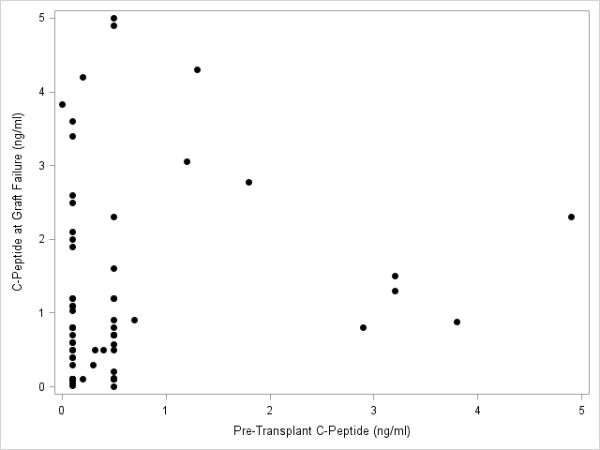Can Post-Transplant C-Peptide Be Used as an Indicator of Pancreas Graft Failure?
1UNOS, Richmond, VA
2Indiana Univ School of Medicine, Indianapolis, IN
3Univ Wisconsin Hospital and Clinics, Madison, WI
4Wake Forest Baptist Medical Center, Winston-Salem, NC
5Univ of Maryland Medical System, Baltimore, MD
6Univ of MN Medical Center, Minneapolis, MN
7Scripps Green Hospital, La Jolla, CA
8Rush Univ Medical Center, Chicago, IL.
Meeting: 2015 American Transplant Congress
Abstract number: 6
Keywords: Graft failure, Outcome, Pancreas transplantation
Session Information
Session Name: Concurrent Session: Controversies in Pancreas Transplantation
Session Type: Concurrent Session
Date: Sunday, May 3, 2015
Session Time: 2:15pm-3:45pm
 Presentation Time: 2:15pm-2:27pm
Presentation Time: 2:15pm-2:27pm
Location: Room 122-AB
Background: The OPTN Pancreas Transplantation Committee is attempting to define pancreas graft failure and performed a study to determine if C-peptide corresponds to pancreas graft failure as reported to the OPTN.
Methods: C-peptide data from 7 participating centers (n=415 graft failures for transplants from 2002-2012) were collected and analyzed after IRB approval. C-peptide values pre-transplant as well as at center-determined graft failure and return to insulin were analyzed for trends between time points.
Results: A total of 233 C-peptide values were submitted at graft failure, 149 values submitted for pre-transplant, and 94 at return to insulin. There were 77 transplants with values at both pre-transplant and graft failure. For recipients in the study who had C-peptide <1 ng/ml pre-transplant and had a post-transplant C-peptide value (n=61), graft failure was declared at varying levels of C-peptide. High C-peptide values at graft failure were not explained by stimulated testing (6% stimulated, 89% fasting, 5% unknown), or by single-center bias. Of the 36 recipients with values at all 3 points, 30 returned to insulin at graft failure.

Conclusions: Centers declare graft failure at varying levels of C-peptide and do not consistently collect C-peptide on patients. Either C-peptide is not used for evaluating graft function, or other factors influence reporting of graft failure. These data do not support use of C-peptide as a criteria for the definition of pancreas graft failure. Obtaining a better understanding of the etiology of pancreas graft failures nationally is hindered by limited objective data collected on OPTN forms and by center-declared graft status.
To cite this abstract in AMA style:
Carrico R, Fridell J, Odorico J, Stratta R, Tyler K, Niederhaus S, Kandaswamy R, Fisher J, Olaitan O, Mujtaba M. Can Post-Transplant C-Peptide Be Used as an Indicator of Pancreas Graft Failure? [abstract]. Am J Transplant. 2015; 15 (suppl 3). https://atcmeetingabstracts.com/abstract/can-post-transplant-c-peptide-be-used-as-an-indicator-of-pancreas-graft-failure/. Accessed July 9, 2025.« Back to 2015 American Transplant Congress
